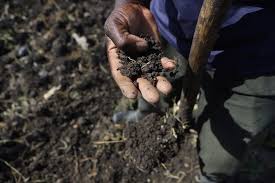When Benson Wanjala began farming in his western Kenya village 25 years ago, his 10-acre farm yielded a robust harvest of 200 bags of maize. This output has now plummeted to just 30 bags. He attributes the decline to his soil, which has transformed from fertile land into a nearly barren field that no longer supports his livelihood.
Like many other farmers, he blames the acidifying fertilizers that have been promoted in Kenya and other African nations in recent years. Wanjala started using these fertilizers to enhance his yield, which initially proved effective but ultimately failed. The Kenyan government introduced a fertilizer subsidy in 2008, making chemical fertilizers more accessible to small-scale farmers.
According to the agriculture ministry, approximately 63% of Kenya’s arable land is now acidic, contributing to a decrease in the production of staple crops like maize, as well as leading exports such as horticulture and tea. The Food and Agriculture Organization reported a 4% drop in maize production, totalling 44 million tons in 2022, although it did not specify the reasons for this decline. The agriculture ministry has not responded to inquiries, especially in light of a scandal involving fake fertilizer discovered in April.
This fraudulent product was found to be quarry dirt sold in misleadingly labelled bags distributed through a national subsidy program. President William Ruto stated that around 7,000 farmers purchased the counterfeit fertilizer and will receive replacements. Soil health issues are escalating as Africa grapples with food security challenges. Despite having 65% of the world’s remaining uncultivated arable land, the continent spends about $60 billion annually on food imports, a figure projected to rise to $110 billion by 2025 due to growing demand and shifting consumption patterns.
In May, Kenya hosted a continent-wide soil health summit to address declining agricultural production, climate change, and food security concerns. Agriculture is a vital sector in Kenya, accounting for over a quarter of the nation’s GDP. At the summit, Stephen Muchiri, executive director of the Eastern Africa Farmers Federation, advocated for a return to traditional farming techniques to revitalize depleted soils. He emphasized the need for crop diversity and minimal disturbance to the land.
“Inorganic fertilizers were never intended to be the cornerstone of crop production,” he stated, adding that “commercially driven farming has rendered our soils poor, acidic, and devoid of biomass and life.” Muchiri suggested that farmers practice crop rotation and utilize compost from livestock such as goats: “We must transition and adapt for our soils to regain their fertility.” Experts warn that soil acidity leads to land degradation by reducing the availability of essential nutrients, making the soil more susceptible to erosion and structural decline. Bridget Mugambe, program coordinator for the Alliance for Food Sovereignty in Africa, recommended phasing out chemical fertilizers.
“Soil health extends beyond the quick solutions offered by chemical fertilizers. These fertilizers have severely harmed our soils in Africa. We must adopt a more holistic view of soil management,” she stated. The African Union’s soil health summit, which previously advocated for increased chemical fertilizer use in 2006, has now adopted a 10-year plan to boost investment in both organic and chemical fertilizers produced locally, aiming to triple their utilization for enhanced agricultural output. During the summit, AU Commissioner for Agriculture Josefa Leonel Correia Sacko highlighted that the continent loses over $4 billion worth of soil nutrients annually.
Kenya relies heavily on imported fertilizers due to low domestic production, primarily sourced from the European Union, followed by Saudi Arabia and Russia. John Macharia, Kenya manager for the Alliance for a Green Revolution in Africa, emphasized that the recent fertilizer scandal should not deter farmers. “It remains crucial for us to collaborate with the government to ensure that the right fertilizers reach our markets,” he stated, suggesting both chemical and organic options tailored to specific soil issues, with soil analysis guiding farmers.
The deterioration of soil quality presents a food security challenge across Africa. In Zimbabwe, once a regional breadbasket, approximately 70% of soils are now acidic. The government previously introduced chemical fertilizers to improve soil quality, but improper usage has led to a decline in organic matter. “Before the introduction of mineral fertilizers, our ancestors understood that adding organic manure would enhance soil fertility and improve crop performance,” remarked Wonder Ngezimana, an associate professor of crop science at Zimbabwe’s Marondera University of Agricultural Sciences and Technology. “This has been a traditional practice in Zimbabwe and across Africa, where people gather various organic materials to enrich the soil.”
These materials include animal manure, grass, leaves, twigs, crop residues, ash, and compost. However, many farmers in Zimbabwe have lost their cattle due to recent droughts, making it challenging to maintain soil health because they cannot produce sufficient organic matter. AGRA recommended that farmers assess their soil’s acidity and apply lime to counteract high acidity levels. Nevertheless, farmers report that both services and inputs are limited and expensive.
Soil testing is available through government agricultural agencies, public universities, and private organizations, with costs ranging from $20 to $40. Wanjala, the farmer, expressed his struggles, stating he cannot even afford cattle for manure, let alone seeds. “I can’t bear any more expenses,” he said. Farai Mutsaka in Harare, Zimbabwe contributed to this report.
